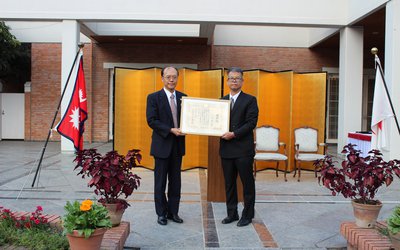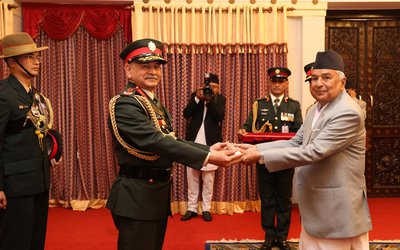Prof. Dr. Shreedhar Gautam
Amod Dev Bhattarai is an established writer in Nepali literature. He is comparatively a young writer, but his writing reflects his rich experience of life and deep understanding about people across the universe. Post graduate students in Tribhuvan University have conducted research on his works to fulfill the partial requirement for the degree of M.A. in Nepali subject, which is a testimony of the recognition of Amod’s artistic genius. He is a widely published writer also in newspaper, journals and magazines ever since his higher secondary school days.
The Chapters is a collection of his short stories written over the last three decades that shaped his mind further and propelled him to the wider realm of literature. Though a translation from Nepali, the beauty of original write-up has been maintained meticulously by the translator. As an accomplished writer, Amod takes his readers to distant lands inhabited by strange people, not visited by himself just on the strength of his imaginative power. He reminds us of the writing of Nired C. Chaudhary, who takes his readers to England in his Autobiography of an Unknown Indian without ever visiting England himself. Like Chaudhary, Amod also gives no room to doubt that he has not visited the places described in his works. It is the miracle of imaginative power of accomplished writers like Amod and Chaudhary.Amod’s stories touch upon all issues and themes, including sex and love mainly focusing upon the real experience of pain and betrayal in everyday life of common people, again testifying the sensitive heart of the writer. Great writers do not confine themselves to the boundaries of nation and race, and Amod too has transcended all such limitations and tells the tales of people of all places across the globe to suggest that all people have identical feelings on fundamental question of life. It is why Amod’s narrative shows plethora of characters reflecting the life style of people in different countries. It is the greatness of the writer that the characters seem quite convincing and real to readers. The first story in the book tells us a story a Nepali man, who is in a fix after coming to Nepal regarding whether to accept his past in Russia or not because of the cultural constraints that bar him from marrying a foreign girl with different culture and race.
The second story portrays the possible consequences of an irrational life style of members in a family if they do not adhere to the code of morality and economy to preserve the foundation structure of their family. We have seen in our own country how many families take the path of disintegration and destruction because of lack of harmony among elders and youngsters. This story helps us understand the tragic story of the once well to do families in Nepali society too. The writer frequently takes us to the foreign land, especially the war torn countries like Cambodia, Afghanistan and the victims of Second World War like Vietnam and Japan by giving an impression that he has visited these countries, experienced their pains and shared their sorrow as an intimate friend of them. Luckily Nepal has not had the bitter experiences of sectarian and communal war as seen in countries like Iraq, Nigeria and Afghanistan. Moreover, these countries have suffered from the wars perpetuated by colonial and imperialists. In Amod’s stories, one can feel the pain of a person who is forced to hide his actual age because of the ugly and inhuman war especially in war turn countries. Similarly, in another story, Amod gives and account of the rescue of prisoners though a well planed diplomatic mission without the volunteers getting involved in the mission, evoking hearty admiration. Amod’s deep insight into the causes and effects of war is reflected here and that in the book. Sometime, he takes readers to Germany where many people still suffer from the harrowing memory of the Second World War that snatched away their dear and near ones. Some stories resemble the quality of science fiction, again a testimony that Amod’s artistic style has several aspects. However, Amod’s style of writing does not put readers in confusion and gives no sense of complexity and complication.
No poets and writers can be aloof from the socio political situation of their countries. Amod is not exception to it, thought he is not an overtly propagandist. Amod touches upon the political reality and history of Nepal. Writers cannot ignore the harsh political reality of their countries, and Amod has done that too. His stories have become powerful also because of his use of devices like irony and paradox too. “And this is not a story” is one of such stories which actually narrates story of man and woman, who is much younger than the former.
While summing up The Chapter, it is a product that has come out of the heart of a writer with high sensibility. The book, however, leaves some unanswered questions, which is quite normal in such writings. Readers may feel that writer has not been equally serious in developing the plot and character. Despite some of such artistic demerits, the book as a whole is a reflection of common people’s feelings, emotions, pleasure, difficulties and political problems too. As the stories take us to different countries across the globe, we get a glimpse of the past and the problem of people like us living in different parts of the world.
It is only through our familiarity to other people’s tales that we can enrich our own experiences and make out of them certain meaning. It is in this sense that Amod has done a great service to humanity by recollecting his experiences and imagination and then turning them into the everlasting treasures of human life. As this book happens to be the first translation in English, readers, especially in English language, would like to see more translation of Amod’s stories.
Written between the periods 1999 to 2012, these stories in a sense are testimonial of Amod’s intellectual growth as an individual. However, a literary account like this book also speaks about the growing familiarity of Nepali writers to the creative writing in other countries. Amod’s personal acquaintance with writers and people of global community has also helped a lot to make his characters representative, who, in his own words, constantly appears in the vicissitudes of real life.
- PM Oli's Visit To China: Geopolitical Implications
- Nov 19, 2024
- NEA: Kul Man Ghising, A Cool Man
- Oct 28, 2024
- DASHAIN FESTIVAL : Festival of Unity
- Oct 04, 2024
- NEPAL-CANADA Bilateral Meeting
- Oct 04, 2024
- MIDDLE BHOTEKOSHI: Final Stage
- Sep 23, 2024
















